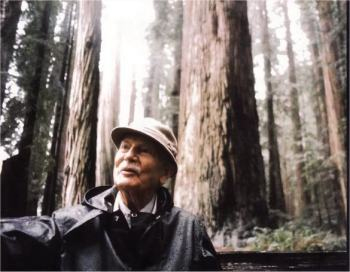Our story: Friends of Nature – making a difference since 1954
“Planting and growing increasing quantities of trees is the scientific solution to Earth’s environmental dilemma.” –Richard St. Barbe-Baker
Read about our founder, Rudy Haase, Canada’s unknown environmental and social activist.
Our first 50 years:
- 1954
Friends of Nature is founded by Martin Rudy Haase to save McGlathery Island on Maine’s mid-coast from being clear-cut for pulp wood. The island was purchased and is still a wilderness sanctuary.
- 1955
First of many annual Friends of Nature sail & camping trips to McGlathery Island.
- 1956
Campaigned for banning DDT, six years before Silent Spring is published.
- 1958

Became North American affiliate of Men of the Trees (founded by Richard St. Barbe Baker in Kenya in 1922)
- 1960
Joined campaign to reforest Sahara desert. “In 8 years the Sahara could be a green homeland for millions of people if a force equal to standing armies of the world started work. A 50, 000 square mile subterranean lake makes St. Barbe Baker’s grand plan possible.”
- 1961
Friends of Nature incorporated under the laws of Maine.
- 1961
Published little booklet, Gardening Without Poisons, by Beatrice Trum Hunter. It becomes a best seller after review in Christian Science Monitor. Entire summer spent filling orders. 35 cent booklet reprinted seven times by 1970, and almost 50, 000 copies sold.
- 1963
Started and led successful campaign to save magnificent plane trees lining Memorial Drive near Harvard University from being cut down to widen drive to 4-lane highway.
- 1964
Last dry tropical forest in Costa Rica saved when government established Cabo Blanco Strict Nature Reserve, after 3-year campaign initiated in North America by Friends of Nature.
- 1965
Friends of Nature is first conservation organization to publicly condemn the Vietnam war as “ecocide”, because of wholesale destruction of forests using the herbicide, Agent Orange, and burning with napalm.
- 1967
Published the booklet, The Man Who Planted Hope and Grew Happiness, by Jean Giono & illustrated by Sandra Kocher. Our authorized translation of this inspiring story of one man’s heroic reforestation of a valley in France, was later “bootlegged” and published in book form as The Man Who Planted Trees. A delightful Frederic Back animated film, with our text narrated by Christopher Plummer, won an Academy Award.
- 1968
Friends of Nature Conservation Society established in Canada.
- 1970
Rudy Haase visited Cabo Blanco Reserve in Costa Rica and finally met Karen and Olof Wessberg, Swedish immigrants who alerted us about the shocking destruction of the last Nicoya peninsula forest. They worked tirelessly for years to create the reserve. Rudy feted in San José by President José Figueres.
- 1972
Richard St. Barbe Baker received Friends of Nature Conservation Award on the Golden Anniversary of founding of Men of the Trees. Rudy accompanied him to Kenya for celebrations and tree planting. His autobiography, My Life, My Trees, is published.
- 1973
Scott Nearing received Friends of Nature Conservation Award on his 90th birthday. He devoted his life to being a friend to everything in nature.
- 1982
St. Barbe Baker died on June 9th in Saskatoon at age 92, after planting his last tree on June 5th on the campus of his alma mater, University of Saskatchewan. We found a burial site near a huge pine tree in the local cemetery. His life ended on a world tour “preaching the gospel of the trees.”
The early achievements of a dedicated life took place in the 1920s in Kenya when he was Conservator of Forests. He initiated the “Dance of the Trees” to promote tree planting by the Kikuyu people. One brave act endeared him forever to them. When his forest workers were being reviewed by the Governor General, St. Barbe stepped in to take the blow intended for a man not standing at attention.
St. Barbe was sacked immediately, and this “black mark” on his record probably kept him from ever receiving the knighthood he later deserved. However, he was the only white man admitted to the Kiama, a society of revered & wise Kikuyus. He was affectionately known as Baba Wa Miti (Father of the Trees).
In 1972, when St. Barbe returned to Kenya he was given a “royal” welcome by President Jomo Kenyatta.
- 1983
Shelter Cove Wilderness Sanctuary established on the NS Eastern Shore.
- 1984
Elizabeth May is first Canadian to receive Friends of Nature Conservation Award. She was honoured for her successful battle to stop the planned anti-budworm spraying of Cape Breton forests.
- 1985
Globe & Mail published a letter by Martin Rudy Haase with big photo and headline: Defending a ‘Priceless Asset’, regarding importance of saving last wilderness in Queen Charlotte Islands.
- 1988
Friends of Nature campaigns to protect Georges Bank from oil and gas drilling.
- 1989
Fletcher Challenge, a major New Zealand company, suspends clear-cutting of BC’s old growth temperate rain forest after Rudy exposed their actions through public meetings and press briefings throughout New Zealand.
- 1990
Wade Davis’ beautiful book, Penan-Voice for the Borneo Rainforest, is published. Friends of Nature provided grant which made his trip possible.
- 1991
Friends of Nature condemns Gulf War as an “environmental disaster.”
- 2002
Major press conference held in Chester to publicize importance of preserving Kaiser Meadow Brook forest. Elizabeth May, Executive Director of Sierra Club of Canada, and Ron Colman of GPI Atlantic, made presentations.

